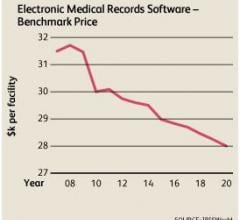April 3, 2009 - Kaiser Permanente has substantially improved the heart attack survival rate for its members in Colorado through an innovative program that links coronary disease patients, and teams of pharmacists, nurses, primary care doctors and cardiologists, with an electronic health record and advanced clinical care registry.
The results of this pilot, the Collaborative Cardiac Care Service, were demonstrated March 26 at the Washington, D.C. briefing, "Reforming the Health Care Delivery System: A Team Approach," co-sponsored by the Alliance for Health Reform, Kaiser Permanente and the AFL-CIO.
With the federal government poised to invest billions of dollars in health information technology, George C. Halvorson, chairman and CEO of Kaiser Permanente, stressed the importance of caregivers’ training, coordination, and ability to use that technology in achieving better health outcomes. Halvorson, joined by Kaiser Permanente practitioners in Colorado, outlined how the organization has put technology -- including its industry leading EHR, Kaiser Permanente HealthConnect into the hands of health providers to enable a full spectrum of personalized and coordinated care. That spectrum includes proactive patient outreach, education, lifestyle adjustments and effective medication management, among other tactics.
“Technology itself cannot solve the health care crisis,” Halvorson said. “Our Colorado region achieved quality care results by aligning people and technology in the most efficient care delivery system. It was not newer or more expensive treatments, but an integrated approach to deliver the right care at the right time."
"Front-line health care workers will be the lynchpin in transforming health care in this country,” said John Sweeney, president of the AFL-CIO, a voluntary federation of 56 national and international unions that represent 11 million workers. “Kaiser Permanente’s success in using technology has underscored that the integration and optimization of a health IT system are dependent on people. Both effective computer systems and skilled clinicians are needed to truly change the way care is delivered and achieve quality outcomes."
The pilot program consists of integrated nursing and pharmacy teams that work collaboratively with heart disease patients and their doctors. The team is connected by technology tools that help them deliver care proven to improve health outcomes. Activities such as lifestyle modification, medication management, patient education, laboratory results monitoring, and management of adverse events are all coordinated through the program, which helps guide the patient through both short-and long-term care decisions.
The program achieved an 88 percent reduced risk of dying of a cardiac-related cause when enrolled within 90 days of a heart attack, compared to those not in the program. The program also helped patients meet their cholesterol goal from 26 percent to 73 percent. The number of patients screened for cholesterol also went up from 55 percent to 97 percent.
Research indicates that fewer than 20 percent of coronary artery disease (CAD) patients are expected to survive 10 years after their first heart attack. The coordinated, evidence-based care, enabled by KP HealthConnect and an electronic care registry, increased that survival rate dramatically. It is estimated that more than 135 deaths and 260 costly emergency interventions were prevented annually, as a result of improved care.
The company will highlight its EHR product at HIMSS in Chicago April 5-8.
For more information: www.kp.org/newscenter


 June 14, 2024
June 14, 2024 









